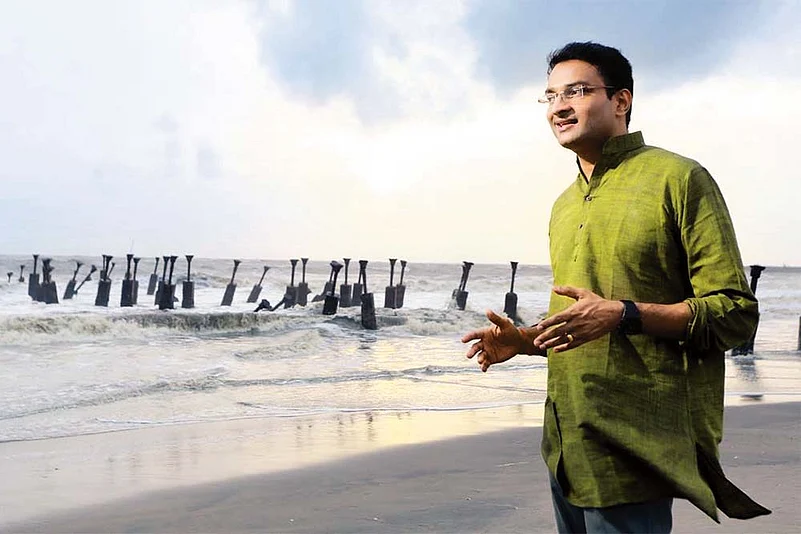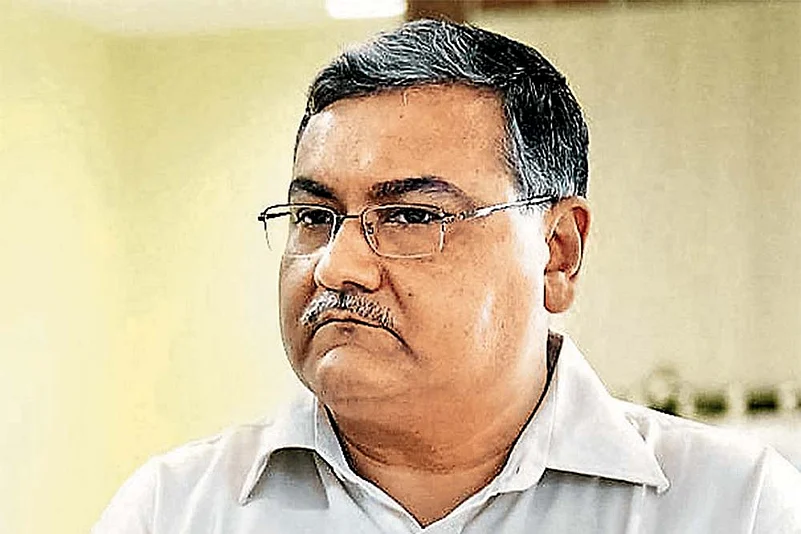They are top managers in their own right. But they do not necessarily have the sought-after MBA degrees from Wharton, Stanford or the hallowed IIMs to flaunt. Yet they do the same job, albeit in more difficult circumstances, and under more pressure—being accountable to the people, ministers and the government. Indian bureaucrats are an often under-appreciated breed who, without fancy training at Indian or global B-schools, have been managing complex portfolios in ministries and departments. In most cases, bureaucrats learn on the job and rise through the ranks. But some, like Durga Shakti Nagpal, seem to be born managers who wield the iron hand to solve problems.
Yes, let’s indeed call them managers, though their work is nothing like that of MBAs in the corporate sector. Public management at the field level (village, block or district) is an altogether different ball game compared to policy management at the state and national level. Field conditions for the bureaucrat are totally unrelated to management concepts, as least as practised in India, and our political science textbooks don’t capture the field either, focusing on purely theoretical aspects. “Bureaucrats at all levels learn their job as they go along,” says former cabinet secretary T.S.R. Subramanian. “Due to stiff competition at all entry levels, the typical government entrant is generally of a higher class compared to the private sector, but he/she is still forced to learn and adapt at each level.”
Unfortunately, as Subramanian says, the role of the bureaucrat is negatively circumscribed. Hard work or objectivity have come to matter less and there are strong indirect pressures for politicisation of the services. And yet, some of them stand out and perform their role as super-managers for our country. Outlook profiles 10 of India’s brightest bureaucrats who have brought in change and made a difference.

Durga Shakti Nagpal, IAS
OSD, Ministry Of Agriculture
Best known for bringing down an unauthorised wall on panchayat land in Noida, earning her the epithet of ‘Deewar Tod’, she also stood up to the illegal sand-mining mafia in the district. She was threatened with dire consequences and suspended, but nothing could demoralise her.
The 2010 batch IAS officer rather steeled her guts and took on the sand mafia head-on. Her team registered over 60 FIRs, arrested over 100 people and seized vehicles used for illegal purposes. Thus, she opened the Pandora’s box and faced the wrath of underworld goons in 2013.
However, the more the pressure mounted on her, the more famous she became in public. She hit the headlines and, at 27, became a household name. Her friends say she was confident when she took on the mafia and never cared about the consequences. She is currently OSD to Union agriculture and farmers’ welfare minister Radha Mohan Singh.

Dr Shrikar K. Pardeshi, IAS
Director in PMO
“People have high expectations from the government and, if you work sincerely, they stand by you,” says Dr Pardeshi, who braved the wrath of political bosses as municipal commissioner in Pimpri-Chinchwad while acting against unauthorised constructions in 2013-14. His action earned him not only people’s support, but also the PMO’s attention. A doctor who specialised in community health, Pardeshi, 43, points out that his training was useful in most postings as “this is a service where one gets the opportunity to handle issues affecting the common man”. Among the challenging tasks this 2001 batch bureaucrat faced was promoting water conservation in drought-hit Nanded district in his native Maharashtra. A winner of many awards for water conservation and e-governance, Pardeshi believes wider exposure through field work and continuing training helps bureaucrats take a broader and holistic view of issues while taking a decision.

Umashankar S.R., IAS
Principal secretary, Department of Animal Husbandry & Fisheries and Department of Kannada & Culture, Karnataka
“No posting is bad or a punishment posting as far as the services is concerned,” says Umashankar S.R., a Karnataka-cadre IAS
officer of 1993 batch who was inspired by his parents to work in the government and by the then director of the IAS academy in Mussoorie, N.C. Saxena, to become “an agent of social change”. Among his career highlights, Umashankar, a post-graduate in economics, recalls having started the process of creating a databank of forest land records on the basis of old notifications, which resulted in the government being able to free up considerable encroached land. What started as a district-level activity was later adopted across the state. Similarly, the process of computerisation of ration cards in 2001 was initiated by Umashankar in Bangalore and its vicinity, leading to the weeding out of bogus cards and saving of subsidised foodgrains and kerosene. This initiative was later taken up not only across Karnataka but also by many other states. A firm believer in training to improve on governance, 51-year-old Umashankar recently did a course in ethics in government and another on issues related to urban development.

Poonam Malakondaiah, IAS
Mission director, NHRM, AP Health, Medical and Family Welfare Dept
A 1988 batch officer, she is known as the bureaucrat nobody messes with. Honest and efficient, her contributions in the departments of education, agriculture, social welfare and civil supplies are well-recognised. As commissioner for agriculture, Malakondaiah took on the US seeds giant Monsanto, challenging the high price of its Bt cotton seeds. The high price had fuelled spurious Bt seed companies, leading to crop failure and farmers’ suicides in AP. A PIL filed by the AP government in 2006 resulted in an injunction against the Indian arm of Monsanto, directing it to charge more reasonable royalty. Other state governments too took a more proactive stance after that. Malakondaiah is also known for making time to meet public petitioners and helping the needy.

Repalle Shiva Praveen Kumar, IPS
Secretary, Telangana Social Welfare and Tribal Welfare Residential Educational Institutions Society
An IPS officer who once studied in a residential welfare school in Kurnool, R.S.P. Kumar believes in investing in the education of underprivileged children. He has streamlined admissions and brought in systematic changes to improve children’s career chances. “Mine is not a 9-5 job but one that can bring about a revolution,” says Kumar, happy that every year 10-15 students from these schools qualify for IITs and other institutes. It was under his guidance that Poorna Malavath and Anand Kumar scaled the Mt Everest. An Ambedkarite, Kumar has consciously discouraged the use of terms such as Dalit, BC, SC, ST in the society he heads. He believes IAS and IPS officers should be role-models for students.

Prasanth N., IAS
District collector, Kozhikode
Prasanth is like a caped crusader rescuing people from their troubles, giving soul to an otherwise aseptic administrative job. Ever since he took over as the DC in February 2015, he has been a media darling for his innovative ways to improve lives in Kozhikode. His initiative Operation Sulaimani ensures no one in the city goes hungry. Anyone without money can collect a coupon from authorised centres and get a meal from any of the 100 partner eateries. Prasanth was able to clean up filthy and clogged ponds in and around the city with the aid of volunteers he recruited on FB. During the recent Onam festivities at the BEM Upper primary school in Puthiyara, Kozhikode, where miscreants had thrown mud into the food cooked by teachers for the Onam sadya (meal) and defecated in the kitchen, he immediately arranged an alternative sadya for the children and teachers. Prasanth is a sure winner.

Sarada G. Muraleedharan, IAS
Joint secretary, Panchayati Raj Ministry
A“ reluctant bureaucrat” is how Sarada Muraleedharan, a 1990 batch IAS officer from Kerala, describes her beginning in the civil services. But her body of work—mostly in the field, whether as a district collector or as head of Kudumbashree, Kerala’s mega programme for empowerment of rural women, and currently in the panchayati raj ministry—suggests that it was a shortlived phase. Muraleedharan talks with great enthusiasm about her vision for empowering the poor. “The best people to train the poor are the poor themselves as their experience is more important than subject knowledge and it helps to structure their experiences into knowledge that can be shared,” says Muraleedharan, 51. She takes satisfaction in her role in creating an interface between the gram sabhas, panchayats and the 30-lakh strong Kudambashree, making it integral to plans for community development. Kudambashree is today a strong political constituency of women, helping them emerge from the shadows of menfolk at home.

Basudeb Banerjee, IAS
Chief secretary, West Bengal
The 1983-batch IAS officer has earned the reputation of being West Bengal CM Mamata Banerjee’s most trusted lieutenant for his superb management skills. Known to prefer working behind the scenes and shun the limelight, he is “indispensable” for the government. The only reshuffle in his case was when he was made chief secretary from home secretary by Mamata. Indeed, Basudeb is known to be consulted by the heads of every single department in the West Bengal government before important policy decisions. “He is also a wonderful human being,” lets on a colleague. “He is soft-spoken, kind and considerate—something that is hard to come by in the competitive bureaucratic world.” Basudeb tells Outlook that his philosophy in life is “work hard, be honest, keep your nose out of trouble”. This star student of economics from Presidency College and Calcutta University has no other tip for those who want to be great managers.

Jacob Thomas, IPS
Director, Vigilance & ACB, Kerala
The public remembers Thomas, a DGP-rank officer, for appearing before the press with his lips sealed with black tape. A symbolic gagging of himself to protest his boss asking him to shut up. He had said “truth will triumph” in the bar-bribery case that rocked Kerala during the UDF rule. As director, vigilance, he had initiated the probe against the then FM K.M. Mani and excise minister K. Babu before being shunted to the Fire Service Department. There, he took on the builders’ lobby for not complying with safety measures for highrises and was transferred pronto to the Kerala Police Housing and Construction as its MD. With the LDF back in power, he’s back in the saddle as the new vigilance chief.

Manish Gupta, IAS
Chief advisor, Power Ministry, WB
He has the rare distinction of having served three governments led by rival political parties. Insiders claim his managerial skills were so sought after that the then CMs, late S.S. Ray of the Congress and late Jyoti Basu of CPI(M), took him into confidence before every political decision. When Buddhadeb Bhattacharya took office, he was appointed as chief secretary. Interestingly, Gupta was home secretary in 1993 when 13 people were killed in police firing on a protest march led by current CM Mamata Banerjee. What really made Mamata hand him the power ministry was his managerial skills, which preceded his reputation. West Bengal became one of the most “electrified” states under his charge. He lost in the 2016 polls but Mamata made him chief advisor of the power ministry. “To be a good manager, you need to be able to lead from the front,” he says.
By Arindam Mukherjee with Lola Nayar, Bula Devi, Minu Ittype, Dola Mitra and Madhavi Tata






















